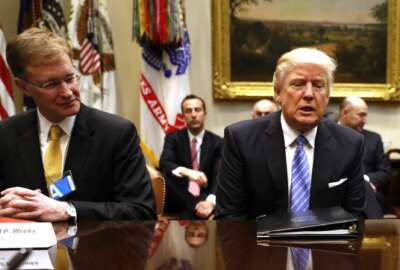
Trump White House: A surprise for Hispanics?
Senior Correspondent Mike Causey says some current and future feds could benefit from the current situation.
Are Hispanics — the fastest-growing demographic in the U.S. — in for a pleasant surprise from the new Trump administration? As in an expanded effort to recruit and promote employees of Hispanic heritage after the hiring freeze.
While most of the predictions about the administration’s plans for feds have been of the gloom and doom variety, some say there could be a silver lining for some current and future civil servants.
Currently, Hispanics make up nearly 15 percent of the American workforce, but only 8.4 percent of the federal government’s civilian workforce. The Justice Department has traditionally been the only major federal operation where Hispanics have a major presence. Now that the hiring freeze predictions have been fulfilled, the next question is who will be frozen? And how long before there is a thaw. And how many vacancies will be available once hiring resumes? In past hiring freezes, places like Justice, along with the Department of Defense, Homeland Security, Veterans Affairs and other agencies have been exempted or quickly excluded.
Hispanics (and Native Americans) are the only groups that are “underrepresented” in the federal workforce. Less than 5 percent of all members of the elite Senior Executive Service are Hispanics.
Citing an OPM report in 2011, the Washington Post said “the widest disparity between the federal and national workforce is still among Hispanics. Their numbers in the federal sector remained flat year-to-year and more than five points below the national average … despite an astounding 43 percent growth rate of Latinos in the U.S. in the last decade.”
Trump has serious image problems with most minority groups. The fact that he trounced Sens. Marco Rubio (R-Fla.) and Ted Cruz (R-Texas) along with all other GOP candidates for the nomination probably didn’t win him many fans in the Hispanic community. But some long-time fed watchers believe the administration could make a major outreach to the fast-growing Hispanic community.
Just before it left office, the Obama administration issued an 11th-hour directive to federal agencies to do more to hire, train and promote Hispanic employees. Some believe it was a last-minute bureaucratic land mine, designed to irk and embarrass the incoming Trump team at the Office of Personnel Management and Equal Employment Opportunity. But a veteran observer of the bureaucracy says “whatever people say about the Trump team, they aren’t stupid. They’ve shown the willingness and ability to turn on a dime,” and a surprise Hispanic outreach, he said, “wouldn’t surprise anybody but his detractors.”
If there is a surprise Hispanic outreach program in government — IF being the operative word — could it hurt other minority groups in hiring and promotion? Maybe. Particularly those that are “overrepresented” in government (compared to their presence in the national workforce) and particularly in top-level SES jobs.
A former national officer of a major federal union pointed out that past predictions of what incoming presidents would do to the civil service workforce have typically been off, if not 180 degrees wrong. For example:
President Jimmy Carter wanted to eliminate the within-grade raises (WIGs) the vast majority of federal workers get every one, two or three years. The Carter folks, in private, called them “being there” raises (like the hapless Peter Sellers character who became a success just by being there) because all people had to do to get them, they said, was show up! The in-grades are worth about 3 percent and eligible workers get them even during a pay freeze. The Federal Times estimated that tens of thousands of workers got their WIGs even during the surprise three-year pay freeze of the Obama administration.
One of President Bill Clinton‘s actions was to propose a federal pay freeze even though the brand-new, bipartisan FEPCA law promised feds “automatic” politics-free annual raises each year until the “gap” between federal and private sector pay was closed. Nobody saw that coming, but it set the stage for future presidents — George W. Bush and Barack Obama — to either low-ball promised federal raises or freeze pay in 2011, 2012 and 2013. Nobody predicted that at the time.
Nearly Useless Factoid
Source: Internet Movie Database
Copyright © 2024 Federal News Network. All rights reserved. This website is not intended for users located within the European Economic Area.
Mike Causey is senior correspondent for Federal News Network and writes his daily Federal Report column on federal employees’ pay, benefits and retirement.
Follow @mcauseyWFED





